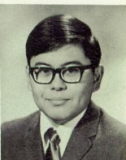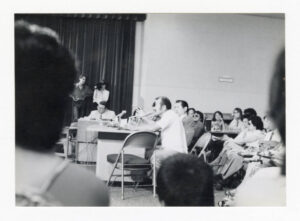AAJA is deeply saddened to hear of the loss of Dwight Chuman, one of our original six founders and a dear friend, respected peer and mentor to many in our AAJA family.
A Sansei, or third-generation Japanese American, Chuman co-founded the Asian American Journalists Association in 1981 with five other Los Angeles-based journalists – Bill Sing, David Kishiyama, Frank Kwan, Tritia Toyota and Nancy Yoshihara. At the time, he was an editor at the Japanese-English language newspaper, the Rafu Shimpo.
Chuman was a social justice warrior shaped by the 1970s Asian American movement who was unafraid to speak truth to power and wanted to “change the world” as a journalist.
He started his journalism career at UCLA with Gidra, a pioneering monthly newspaper focusing on the Asian American experience. From there, he answered an ad for a staff writer position at the Rafu Shimpo and worked there as an editor for 10 years before going into broadcasting at KCET. Chuman’s dream was to publish a four-color monthly magazine, and eventually, he published a Las Vegas leisure magazine. He loved journalism, remarking, “Once you get into that atmosphere…you’re forever a journalist, will forever analyze the news from a journalist’s point of view. It’s addictive, you can never drop it.”
About AAJA, Chuman admitted, “At the beginning, I didn’t know what the organization would do.” Soon, however, he realized the strength in community AAJA provided, nurturing shared goals and creating lasting bonds among Asian American journalists.
He will be remembered for his fierce spirit and passion for justice, particularly for his 1981 statement before the Commission on Wartime Relocation and Internment of Civilians to fight for redress for Japanese Americans incarcerated during World War II. In it, he spoke of his parents and community elders’ imprisonment during the war and their uses of the phrases “before camp” and “after camp,” arguing that “four long decades have not healed many of the damages inflicted from within.”

Gardena High School yearbook photo, 1968. Source: U.S., School Yearbooks, 1900-2016, Ancestry.com

Dwight Chuman (dark glasses) at Charles Hamasaki’s Commission on Wartime Relocation and Internment of Civilians (CWRIC) hearing, 1981. Source: Janice Yen Nikkei for Civil Rights and Redress Collection at CSU Dominguez Hills Department of Archives and Special Collections
It was Chuman’s life’s work to always challenge mainstream views and bring attention to the intersectional struggles that our communities faced. In 1979, to the shock of many, he published Judy Tachibana’s article on Japanese American lesbians above the Rafu Shimpo’s masthead.
Kishiyama, Chuman’s AAJA co-founder, remembered that he fought to circulate a petition for the freeing of a jailed Southeast Asian journalist in the very earliest days of the organization.
AAJA inducted Chuman, along with his fellow five co-founders, into our Inaugural Hall of Fame in 2022.
– The Asian American Journalists Association and the AAJA-Los Angeles chapter



